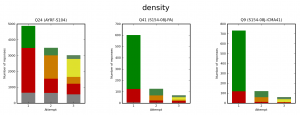The title of this post may sound contradictory. If we give students marks, the assessment is summative. Right? Not necessarily. It is perfectly possible to tell students their ‘mark’ for an assignment but for that mark not to count towards the final outcome (so this assessment is purely formative). Similarly, it is possible for a grade from an assignment to count towards the final outcome (and so be summative) even if the student is not told this grade.
Confusion over this point has clouded my thinking about whether iCMAs (interactive computer-marked assignments) should be formative or summative. I am increasingly accepting the argument that telling students their grade for an assignment at the same time as giving feedback can dilute the effect of the feedback – if the student gets a good grade they may think that they don’t need to improv, so reason that there is no point in reading the feedback; if the student gets a poor grade they may think that it is impossible for them to improve to the required standard and so, again, not read the feedback. But I know that students engage with feedback from iCMAs at a deeper level if the iCMA is summative.
One example of this is illustrated in the figure below. The three charts are for variants of the same question (a question requiring the student to use a provided word equation to calculate density) in low-stakes summative, formative-only and diagnostic use. In each case the student was given three attempts, with increasing feedback provided. Green represents a correct reponse; red/orange/yellow represents an incorrect response – and the colour stays the same if the response is unchanged from first to second or from third to second attempt. Grey represents a ‘blank’ response : in summative use, 21% of the third-attempt responses were identical to those given previously with 2% of them blank; in formative-only use, 46% of the third attempt responses were identical to those given previously with 7% of them blank; in diagnostic use, 55% of the third attempt responses were identical to those given previously with 19% of them blank.
In the context of what I am discussing in this post, the relevant point is that, even in summative use, students are not told their mark for the question or for the whole iCMA at the same time as being given the feedback. For this particular module, they are given their overall iCMA score at a later stage (once the score has been ratified, usually around a week later). For other modules they are not given their iCMA score at all, just whether or not they have passed – students don’t seem to like this much, but it is a reflection of the fact that borderline decisions are made by a human-marker, looking at the responses that the student has entered into the computer.
I’m not saying that summative use of iCMAs is necessarily the best way forward – students still seem to be preoccupied by the minutiae of the grading – but the issue is a different one to whether students are distracted from the feedback provided by seeing a numerical score or grade at the same time.


Dear Sally,
What an interesting post. I really like this sort of data. However, I do not really grasp when feedback and grade are provide in de iCMAs. Do I get it right that for diagnostic and formative use, no grade is provided and with summative testing the grade is provided? And is feedback provided after finishing the complete test or after answering each question? This all is sort of relevant.
For the rest I would like to point you to an interesting article on feedback that you can relate your finding to. You would be surprised that your finding is quit interesting.
Hattie, J., & Timperley, H. (2007). The Power of Feedback. Review of Educational Research, 77(1), 81-112. doi:10.3102/003465430298487
Kind regards,
Silvester
Hi Silvester
You are absolutely right that it matters when the feedback is given! The eAssessment systems that we use at the UK Open University provide options to give feedback whilst the student is doing the question or after they complete the quiz. The modules I am involved with all give feedback as the student is doing the question – there is more on this if you click on the ‘eAssessment at the Open University’ link on the right-hand side of the blog.
We sometimes tell students their mark when they have finished the quiz (sometimes immediately afterwards, sometimes – when in summative use – after a delay whilst the grade is ratified, and sometimes not at all). There is a not a direct correlation between us TELLING the student their mark (i.e. how well they did overall) with whether the mark counts towards their overall score (i.e. whether the assessment is summative). I hope this makes sense – it is very difficult to explain!
thanks for your interest
best wishes
Sally